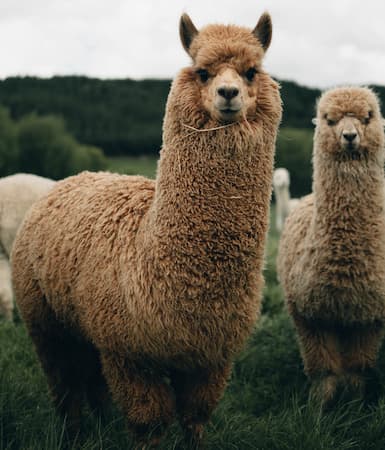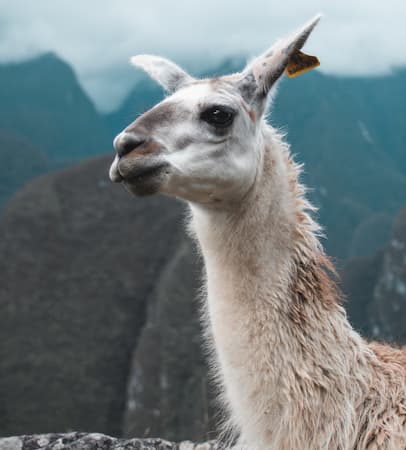National Llama Day

About National Llama Day
When is National Llama? This special day is always observed on December 9
Many people describe Llamas as mystical and magical creatures. While other people see these members of the Camelid family as cute and fuzzy farm animals or pets. Yes, that’s right. You can have one as a pet. Or, you can keep a Llama as a therapy animal. And, they are a common attraction at zoos around the world. Wherever you see them, you quickly become enamored with this lovable creature. Today is National Llama Day. It is sometimes called Llama Appreciation Day. Appropriately on this December 9 holiday, we celebrate them and spend time appreciating adorable llamas.
Today is a perfect time to visit your local zoo to see them. They make good animals in petting zoos, too. But, don’t irritate them as they are known to spit. If you can’t get to see them live today, spend some time learning more about them. And, pull up pictures of them on the internet.
About Llamas
Llamas are members of the Camelid family. They are related to camels. As a camelid, they are more able to survive droughts than most other animals. Adults grow up to six feet tall. When mature, they weigh 400 to 500 pounds. Their close cousin, the Alpaca, looks very similar, only smaller. Alpacas are also domestic animals. Both Llamas and Alpacas are native to South America.
Versatile and useful Llamas are native to the Andes Mountains of Peru and Bolivia in South America. They once roamed North America, too. But, they died off during the Ice Age. Today, most wild herds live in their native South America. Additionally, there are Llama farms in the United States and other countries.
Many thousands of years ago, natives in South America hunted them for food and clothing. Originally, they were found high in the Andes mountains at elevations of 13,000 to 14,500 feet. Natives in Central America domesticated them over 6,000 years ago. Ancient Incans brought them down from the mountains and raised them for a variety of reasons. Notably, this beast of burden is a great pack animal.
Today, most Llamas that live in the wild are in South America. In South America, domestic Llamas are used as both pack animals and farm animals where they are grown for meat and wool. However, many countries imported them, primarily in the Americas and Europe.
How Llamas are Used
Llamas, a member of the Camelid family, are used for many purposes. Here are some of them:
- As previously mentioned, they are excellent pack animals.
- They have fed people for many thousands of years.
- Tallow or fat from them, is used in making candles.
- Clothing is made from Llama wool.
- You can even make string from the wool.
- Their excrement is a source of fuel.
- They make great guards for livestock, most notably sheep. 78% of domesticated llamas guard livestock.
- Llamas are found in many petting zoos.
- Some people keep them as pets.
- Llamas are also used as somewhat docile therapy animals.
Population of Llamas Around the World
There are an estimated 7 million Llamas and Alpacas around the world in the world and zoos. About 5 million are Llamas. The population goes up and down with changes in people’s attitude towards them. Years ago, they were an investment. Their numbers went up and down with their popularity. People spent big money to get them. People bought them simply to keep as pets. Then, as interest in them dropped, so did prices. Today, you can buy a Llama to guard your livestock for under $600. Accordingly, with the drop in demand, their population dropped off, too.
Here are some of the estimated Llama populations in select countries:
Peru: 750,000
United States of America: 165,000
Argentina: 75,000
Chili: 70,000
Germany: 15,000
Canada: 6,000
United Kingdom: 5,000
New Zealand: 1,500
Did You Know? In 1986, a single Llama was auctioned off in Salem, Oregon for $220,000. It remains a world record.
How to Celebrate National Llama Day
This December 9 holiday celebrates and cute and lovable animal. So, here are some ways to celebrate Camelids on National Llama Day:
- Go to a zoo or Llama farm to see them. Take your kids, niece, or nephew with you.
- Go to a petting zoo that has one. Feel how soft the wool is.
- Learn more about them.
- Teachers can have the class draw them in art class.
- Be creative. Make llama cookies. Take cookie dough and shape it like a llama. Then, decorate it with decorative sugars and candies.
Today's Quote
“Love and compassion are necessities, not luxuries. Without them humanity cannot survive.” – – Dalai Lama

History and Origin of National Llama Day
This holiday originated in Manitoba, Canada in 1932. During that year, there was a drought and many domesticated animals died. However, the hardy Llama survived that dreadful summer. This led to the creation of Llama Day. Canada celebrates this holiday from sunup to sundown.
Our research showed this holiday spread to the United States. And in the U.S. is it called National Llama Day. We did not find any documentation of why the word “National” was added to the title. And we found no U.S. congressional records or presidential proclamation about this special day.
Definition of “National” Days – Find out why it is important to distinguish true National days.
This Day in History
Additionally, here are some of the things that happened on this day:
- “A Charlie Brown Christmas” premieres on television on CBS. (1965)
- Lech Walesa wins Poland’s first direct presidential election. (1990)
- Actor Beau Bridges was born on this day in 1941.
More December 9 Holidays
Besides National Llama Day, here are more December 9 holidays we’re sure you will enjoy:
More About Today
This Day in History – Indeed, many other important events occurred on this date.
Famous December Birthdays – Did you ever wonder what famous people share your birth date? If so, then find out now!
Recipe of the Day: May we suggest: Candy Cane Cookies
Also See: Holiday Recipes and Pumpkin Recipes Galore
Ecards To celebrate this Camelid, send a free Ecard for National Llama Day or just about any December calendar holiday, occasion, observance, or event. Undoubtedly, it’s fun for both the sender and the recipient.
Holiday Insights, where every day in December is a holiday, a bizarre or wacky day, an observance, or a special event. Thus, please join us in the daily calendar fun each and every day of the year.
Did You Know? Moreover, in addition to National Llama Day, there are literally thousands of daily holidays, special events, and observances, more than one for every day of the year. and many of these holidays are new. People and organizations are creating new holidays regularly. December holidays are no exception. Consequently, at Holiday Insights, we take great efforts to thoroughly research and document the details of each one, as completely and accurately as possible.